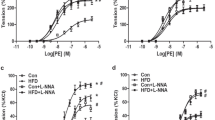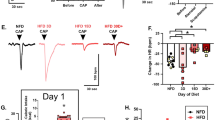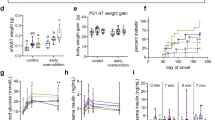Abstract
Fructose overconsumption is a worldwide trend, and it has been found to cause metabolic disorders in parents and their offspring. Additionally, metabolic syndrome has been closely associated with increased cardiovascular risk. In this study, we hypothesized that the chronic fructose consumption by parents could trigger autonomic dysfunction and cardiometabolic disorders in their offspring. Wistar rats undergo an intake of 10% of fructose in drinking water or regular water for 60 days before mating. Their offspring, control (C) and fructose (F) groups, were evaluated 30 days after weaning. Lower birth weight, increased levels of blood triglycerides and insulin resistance were observed in F compared to C group. The offspring of the fructose parents showed increased mean arterial pressure (C: 104 ± 1 vs. F: 111 ± 2 mmHg) and baroreflex sensitivity impairment, characterized by reduced bradycardic (C: −1.6 ± 0.06 vs. F: −1.3 ± 0.06 bpm/mmHg) and tachycardic responses (C: −4.0 ± 0.1 vs. F: −3.1 ± 0.2 bpm/mmHg). Finally, a higher baroreflex-induced tachycardia was associated with lower insulin tolerance (r = −0.55, P < 0.03) and higher systolic arterial pressure (r = 0.54, P < 0.02). In conclusion, our findings indicate that the excessive consumption of fructose by parents is associated with early autonomic, cardiovascular, and metabolic derangement in the offspring, favoring an increased cardiometabolic risk when they reach adulthood.
This is a preview of subscription content, access via your institution
Access options
Subscribe to this journal
Receive 12 print issues and online access
$259.00 per year
only $21.58 per issue
Buy this article
- Purchase on Springer Link
- Instant access to full article PDF
Prices may be subject to local taxes which are calculated during checkout

Similar content being viewed by others
Data availability
The datasets generated during and/or analyzed during the current study are available from the corresponding author upon reasonable request.
References
Whelton PK, Carey RM, Aronow WS, Casey DE, Collins KJ, Himmelfarb CD, et al. 2017 ACC/AHA/AAPA/ABC/ACPM/AGS/APhA/ASH/ASPC/NMA/PCNA guideline for the prevention, detection, evaluation, and management of high blood pressure in adults: executive summary: a report of the American College of Cardiology/American Heart Association Task Force on Clinical Practice Guidelines. J Am Coll Cardiol. 2018;71:2199–269. https://doi.org/10.1016/j.jacc.2017.11.005.
Brito JO, Ponciano K, Figueroa D, Bernardes N, Sanches IC, Irigoyen MC, et al. Parasympathetic dysfunction is associated with insulin resistance in fructose-fed female rats. Braz J Med Biol Res. 2008;41:804–8. https://doi.org/10.1590/S0100-879X2008005000030.
Conti FF, Brito J, de O, Bernardes N, Dias D, da S, et al. Cardiovascular autonomic dysfunction and oxidative stress induced by fructose overload in an experimental model of hypertension and menopause. BMC Cardiovasc Disord. 2014;14:185. https://doi.org/10.1186/1471-2261-14-185.
Bernardes N, da Silva Dias D, Stoyell-Conti FF, de Oliveira Brito-Monzani J, Malfitano C, Caldini EG, et al. Baroreflex impairment precedes cardiometabolic dysfunction in an experimental model of metabolic syndrome: role of inflammation and oxidative stress. Sci Rep. 2018;8. https://doi.org/10.1038/s41598-018-26816-4.
Saad AF, Dickerson J, Kechichian TB, Yin H, Gamble P, Salazar A, et al. High-fructose diet in pregnancy leads to fetal programming of hypertension, insulin resistance, and obesity in adult offspring. Am J Obstet Gynecol. 2016;215:378.e1–6. https://doi.org/10.1016/j.ajog.2016.03.038.
Seong HY, Cho HM, Kim M, Kim I. Maternal high-fructose intake induces multigenerational activation of the renin-angiotensin-aldosterone system. Hypertension. 2019;74:518–25. https://doi.org/10.1161/HYPERTENSIONAHA.119.12941.
Asghar ZA, Thompson A, Chi M, Cusumano A, Scheaffer S, Al-Hammadi N, et al. Maternal fructose drives placental uric acid production leading to adverse fetal outcomes. Sci Rep. 2016;6:25091. https://doi.org/10.1038/srep25091.
Iyengar A, Nesargi S, George A, Sinha N, Selvam S, Luyckx VA. Are low birth weight neonates at risk for suboptimal renal growth and function during infancy. BMC Nephrol. 2016;17:100. https://doi.org/10.1186/s12882-016-0314-7.
Knop MR, Geng T-T, Gorny AW, Ding R, Li C, Ley SH, et al. Birth weight and risk of type 2 diabetes mellitus, cardiovascular disease, and hypertension in adults: a meta-analysis of 7 646 267 participants from 135 studies. J Am Heart Assoc. 2018;7:e008870. https://doi.org/10.1161/JAHA.118.008870.
Sullivan MC, Winchester SB, Msall ME. Prematurity and cardiovascular risk at early adulthood. Child Care Health Dev. 2019;45:71–8. https://doi.org/10.1111/cch.12616.
Yamazaki M, Yamada H, Munetsuna E, Ishikawa H, Mizuno G, Mukuda T, et al. Excess maternal fructose consumption impairs hippocampal function in offspring via epigenetic modification of BDNF promoter. FASEB J. 2018;32:2549–62. https://doi.org/10.1096/fj.201700783RR.
Powell ES, Smith-Taillie LP, Popkin BM. Added sugars intake across the distribution of us children and adult consumers: 1977-2012. J Acad Nutr Diet. 2016;116:1543–50.e1. https://doi.org/10.1016/j.jand.2016.06.003.
Grassi G, Ram VS. Evidence for a critical role of the sympathetic nervous system in hypertension. J Am Soc Hypertens. 2016;10:457–66. https://doi.org/10.1016/j.jash.2016.02.015.
Dos Santos F, Moraes-Silva IC, Moreira ED, Irigoyen M-C. The role of the baroreflex and parasympathetic nervous system in fructose-induced cardiac and metabolic alterations. Sci Rep. 2018;8:10970. https://doi.org/10.1038/s41598-018-29336-3.
La Rovere MT, Bigger JT, Marcus FI, Mortara A, Schwartz PJ. ATRAMI (Autonomic Tone and Reflexes After Myocardial Infarction) Investigators Baroreflex sensitivity and heart-rate variability in prediction of total cardiac mortality after myocardial infarction. Lancet. 1998;351:478–84. https://doi.org/10.1016/s0140-6736(97)11144-8.
Valensi P, Nguyen TN, Idriss S, Cazes P, Karam G, Paries J, et al. Influence of parasympathetic dysfunction and hyperinsulinemia on the hemodynamic response to an isometric exercise in non-insulin-dependent diabetic patients. Metabolism. 1998;47:934–9. https://doi.org/10.1016/s0026-0495(98)90347-x.
Sinaiko AR, Steinberger J, Moran A, Hong C-P, Prineas RJ, Jacobs DR. Influence of insulin resistance and body mass index at age 13 on systolic blood pressure, triglycerides, and high-density lipoprotein cholesterol at age 19. Hypertension. 2006;48:730–6. https://doi.org/10.1161/01.HYP.0000237863.24000.50.
Funding
This study was supported by the Coordination for the Improvement of Higher Education Personnel (CAPES), Universidade Nove de Julho (UNINOVE) from Brazil and the São Paulo Research Foundation (FAPESP 2018/17183-4; 2022/04050-1). KDA and MCI are recipients of a CNPq Fellowship (CNPq-BPQ).
Author information
Authors and Affiliations
Contributions
CP, contributed to the acquisition of data, analysis and interpretation of data, statistical analysis and draft the manuscript; ANV contributed to acquisition and analysis of data and revised version of the manuscript; AAA and NB contributed to acquisition and analysis of data and draft the manuscript; DdSD, TPS and DRS contributed to acquisition and analysis of data; KDA and MCI contributed to conception and design of the work, analysis, and interpretation of data, statistical analysis and draft the manuscript.
Corresponding author
Ethics declarations
Competing interests
The authors declare no competing interests.
Additional information
Publisher’s note Springer Nature remains neutral with regard to jurisdictional claims in published maps and institutional affiliations.
Rights and permissions
Springer Nature or its licensor (e.g. a society or other partner) holds exclusive rights to this article under a publishing agreement with the author(s) or other rightsholder(s); author self-archiving of the accepted manuscript version of this article is solely governed by the terms of such publishing agreement and applicable law.
About this article
Cite this article
dos Santos, C.P., Nascimento-Filho, A.V.d., Araujo, A.A. et al. Parental fructose consumption induces early baroreflex dysfunction in offspring: impact on arterial pressure and on insulin resistance. Int J Obes 48, 284–287 (2024). https://doi.org/10.1038/s41366-023-01409-y
Received:
Revised:
Accepted:
Published:
Issue Date:
DOI: https://doi.org/10.1038/s41366-023-01409-y



